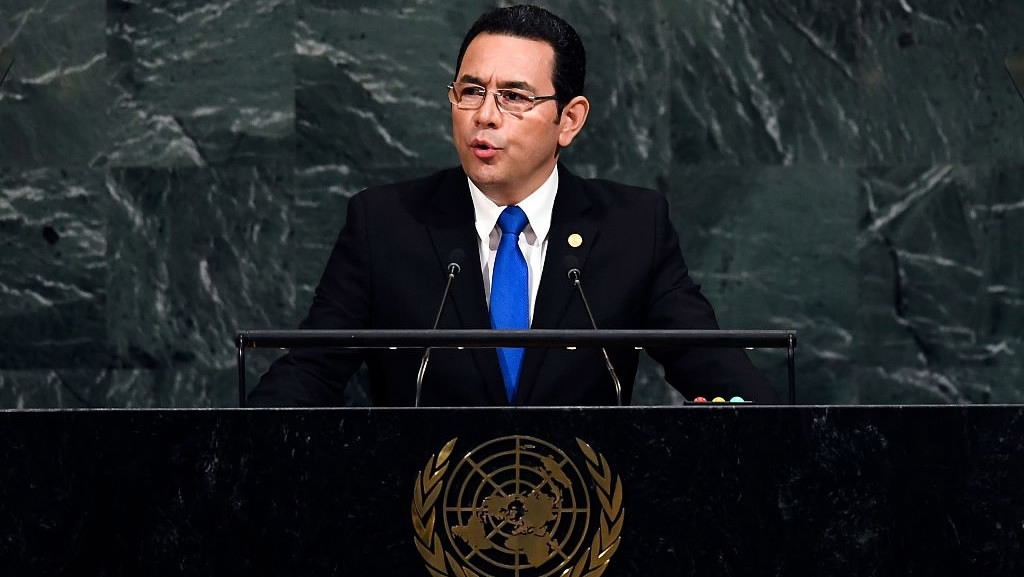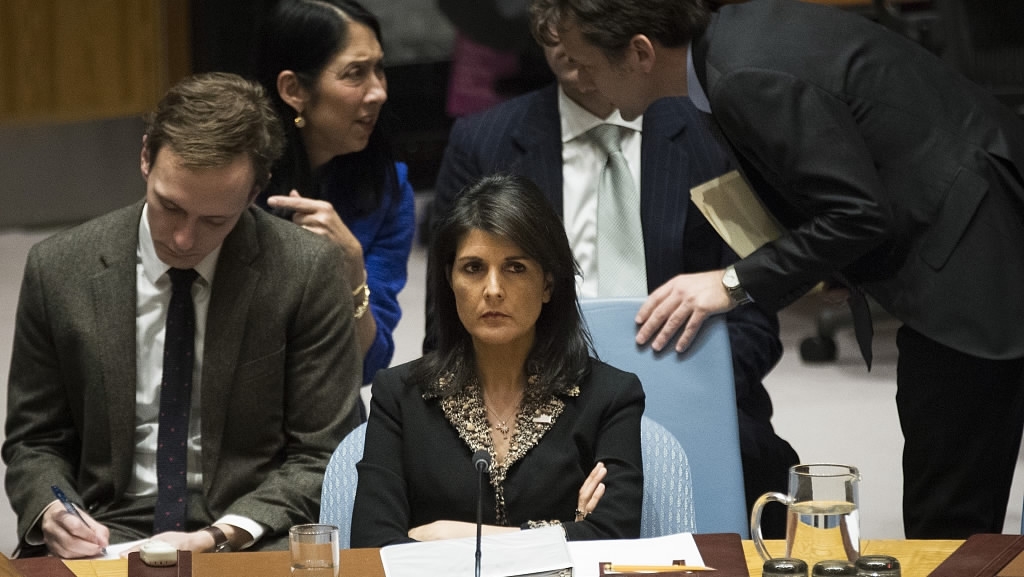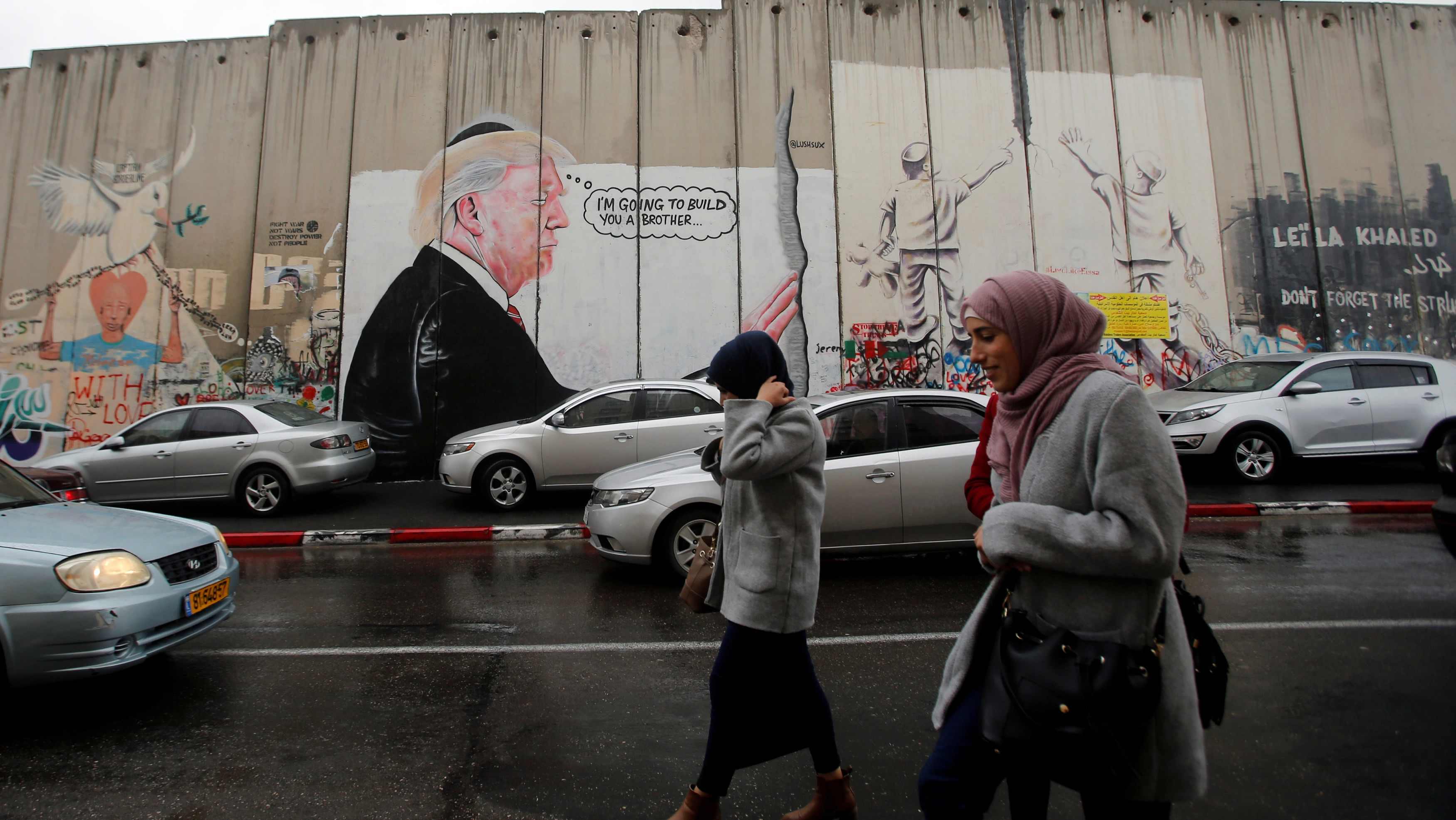
Politics
17:23, 25-Dec-2017
Six questions after Guatemala follows US lead on Jerusalem
By John Goodrich

The United States became the only country to formally recognize Jerusalem as the capital of Israel – other than Israel – on December 6, 2017.
President Donald Trump said the move, widely condemned by the international community, was “in the best interests of the United States of America and the pursuit of peace between Israel and the Palestinian”.
Following a week in which Guatemala followed the US lead but 128 countries at the UN opposed Washington’s stance, what are the outstanding issues as the fallout from Trump’s controversial Jerusalem call continues?
Will other countries follow the US?
Israeli Prime Minister Benjamin Netanyahu predicted that a spree of other nations would follow Trump’s call on Jerusalem, but amid the initial outcry there appeared little likelihood of that happening.

Guatemala's President Jimmy Morales. /VCG Photo
Guatemala's President Jimmy Morales. /VCG Photo
On December 24, however, Guatemalan President Jimmy Morales said his nation would also move its embassy from Tel Aviv to Jerusalem. Like the US, he didn't put a timescale on the relocation.
The Central American country also backed the US at the UN on December 22, one of only nine to support Washington. Of the other six, none has an embassy in Israel.
The Czech Republic is widely rumored to be considering moving its embassy from Tel Aviv to Jerusalem, but the lack of follow-through has played into the narrative of US isolationism in the Trump era.
How isolated is the US?
The US was in a club of just nine when the 193-member General Assembly overwhelmingly adopted a non-binding resolution condemning Washington’s recognition of Jerusalem as Israel’s capital.
The Trump administration threatened to cut off aid to countries that voted against it, and there were 65 abstentions or no-shows along with the nine countries opposing the motion.
However, the support of 128 countries, including traditional Middle Eastern allies and UN Security Council members China, Russia, France and the UK, did not go down well in Washington.

US Ambassador to the United Nations Nikki Haley. /VCG Photo
US Ambassador to the United Nations Nikki Haley. /VCG Photo
"The United States will remember this day in which it was singled out for attack in the General Assembly for the very right of exercising our right as a sovereign nation," warned US Ambassador to the UN Nikki Haley.
The US anger towards the UN, which Haley said had “anti-Israel bias”, was echoed by Israeli Prime Minister Benjamin Netanyahu, who denounced the UN as a “house of lies.” Palestinian President Mahmoud Abbas called the vote "a victory for Palestine."
Will the US really cut aid?
The US threatened to cut aid to countries that opposed it in the UN General Assembly vote, a warning that led to Turkey condemning Washington as a bully.
“For all these nations, they take our money and then vote against us. They take hundreds of millions of dollars, even billions of dollars and then they vote against us,” Trump told reporters ahead of the vote.
“We’re watching those votes. Let them vote against us. We’ll save a lot. We don’t care.”
Will the US follow through with the threat, in the knowledge that other countries would be willing to fill any aid vacuum?
Is a third intifada conceivable?
Trump’s announcement triggered weeks of clashes between Palestinians and Israeli security forces, with 12 Palestinians killed in Gaza and the West Bank since December 6.

Israeli security forces clash with protesters in Bethlehem, West Bank on December 23, 2017. /VCG Photo
Israeli security forces clash with protesters in Bethlehem, West Bank on December 23, 2017. /VCG Photo
The third intifada urged by Hamas has not materialized, however, and though violent, the protests have not yet exploded in the way many had feared.
What next for the peace process?
The US decision was seen by Palestinians as a sign that the traditional broker in the peace process was siding with Israel.
Abbas denounced the US as a “dishonest mediator” following the announcement. On Sunday, Netanyahu hit out at Abbas for saying he was not interested in any peace proposal from the US.

Palestinians walk past a mural depicting US President Donald Trump that is
painted on a part of the Israeli barrier, in the West Bank city of Bethlehem on December 6, 2017. /Reuters Photo
Palestinians walk past a mural depicting US President Donald Trump that is painted on a part of the Israeli barrier, in the West Bank city of Bethlehem on December 6, 2017. /Reuters Photo
US officials have repeatedly argued that in time, Trump’s decision will jolt forward the peace process. The US is rumored to be working on a plan for the wider region, aimed at containing Iran.
Whether the US will be trusted to broker future negotiations, while Trump remains president, is unclear. Vice President Mike Pence has postponed a trip to the Middle East after scheduled meetings were canceled.
Other actors, including Russia and France, are jostling to play a greater role in the region.
Is Trump's decision popular in the US?
Haley claimed Trump’s decision was made on the basis of support from the American people, but a CNN poll released on December 22 indicates a majority are opposed to moving the US embassy.
The split is sharply along party lines, however. Seventy-nine percent of Republican voters back recognizing Jerusalem as Israel’s capital, and 66 percent support moving the US embassy there. Seventy-one percent of Democrats oppose both.

SITEMAP
Copyright © 2018 CGTN. Beijing ICP prepared NO.16065310-3
Copyright © 2018 CGTN. Beijing ICP prepared NO.16065310-3